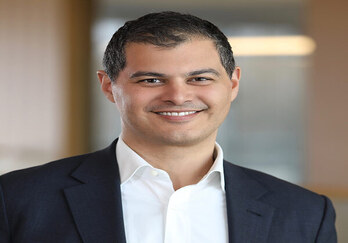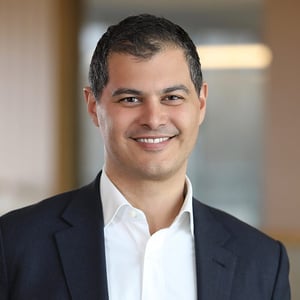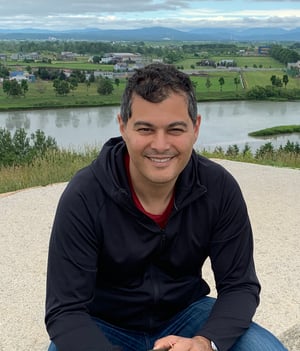Career Perspectives: Interview with Yannis Jemiai, Chief Scientific Officer

As Chief Scientific Officer, Dr. Yannis Jemiai plays a pivotal role in maintaining Cytel’s well-established reputation for statistical excellence and our track-record of bringing innovative analytic approaches to the development of medicines for human health. With oversight for the corporate-level Scientific Agenda, Yannis ensures Cytel continues to be known for thought leadership in adaptive designs while expanding its reputation in Bayesian statistics, Complex innovative designs, and the use of Real-World analytics for regulatory and post-approval purposes. Yannis’ research interests include adaptive trial design, causal inference, decision theory, and regulatory affairs.
In this blog we talk to Yannis about his long-standing association with Cytel, his views on adaptive designs and their future; and we get some tips from him for young statisticians, programmers and those interested in pursuing a career in this field.
 You have been working at Cytel for over 15 years and have carried out diverse roles. How has this journey been for you?
You have been working at Cytel for over 15 years and have carried out diverse roles. How has this journey been for you?
It has been a very exciting journey with varied experiences and many things to learn. Cytel has drastically evolved as a company since the time I joined. When I started working here there were about 35 employees and the business was mostly focused on software and a bit of consulting. Today, we have over one thousand employees and are a very different company from when we started. So, it has been interesting for me to see the company evolve and grow. These years have also been very rewarding as our mission to bring better statistical thinking, design and analysis to the industry has paid off. We continue to pioneer new ways of applying quantitative thinking and sophisticated analytics to the business of developing life-saving medicines.
How did you identify statistics as the right career for you?
Very much by chance. I happened to study biostatistics during grad school because it involved both math and biology, subjects that interested me. Once I learned more about biostatistics, I found it fascinating to the point of wanting to pursue a PhD in it. I soon found myself at Harvard studying with some of the greatest biostatisticians, including Marvin Zelen, L.J. Wei, Jamie Robins, Andrez Rotniztky, and of course Cyrus Mehta!
As the Chief Scientific Officer, what are your key responsibilities?
My key responsibilities include ensuring the thought leadership of the company stays current and forward-thinking; that we continue to publish and present, and overall that we remain an innovating company. Another big part of my job is to focus on product strategy. I oversee the development of Cytel’s software product lines, plan how our software should evolve and decide on what more can be done to maintain our industry leading software status.
Your research has involved complex innovative designs including adaptive trials. What challenges does a company face when implementing adaptive trials?
In my opinion, part of the challenge is educating everyone involved in a trial. We may be familiar with adaptive designs, but there are many people involved in clinical trials, including patients, who need to be educated on how trials are designed and what are the benefits of using adaptive designs. We need to create more awareness on why it is a good idea to use adaptive trials, for regulators, investigators and patients. I think this is getting easier with time as more and more people are becoming familiar with such methods.
Another big challenge is the implementation of adaptive designs. Using innovative designs implies changing the status quo. Most people are not comfortable with the idea of change and believe it will make their jobs harder. The solution to overcome this challenge is education, tenacity and persuasion.
Every time we are involved in an implementation, we present the difference between what can be achieved through complex innovative designs as compared to using traditional designs. The designs generally speak for themselves. Interests and knowledge can vary depending upon the audience you are talking to. Hence, it is important to present your ideas in the right way, using the right language.
What do you think the future looks like for implementing complex innovative designs?
Complex innovative designs are going to be around for a long time. They are going to grow in number as new designs are developed. The traditional designs will also have a role to play and will not be entirely stopped. The complexity of drug development is ever increasing and so, we need new tools and solutions to address the challenges. Thus, innovative designs will continue to evolve and play a big role in advancing the field of research.
What excites you about working in this field?
At the end of the day, it is really about patients and public health. That is what really drives me and probably drives most of the people in our company, and in the industry. We want to make a difference in the world, and it is an exciting time to do so as things in the field of medicine are moving in an interesting direction. There are a lot of new challenges as we move on to precision medicine and biomarkers. Some people have said that the 21st century is the century of biotech. Hence, there are many problems to be solved, most of which have resulted due to an explosion of data. Statistics is quite well positioned and poised at this time. Our profession is in high demand and it is truly an exciting time to be working in this field.
Can you tell us about your most memorable achievement or project?
The most satisfying projects involve getting a medicine to market. I am proud to have been involved together with Cytel colleagues in designing innovative adaptive trials for some of our clients, that have been pivotal to securing marketing authorization from health authorities. It generally takes a while before we get to see any positive outcomes of a trial that we have supported. The fact that these study designs were adaptive make the success story ever more satisfying.
What would be your top tips for early career statisticians looking to develop in this field?
You have to be curious and eager to learn, which most people are in our field. You should venture outside of your comfort zone and focus on soft skills like verbal communication and writing ability. Most statisticians learn hard skills through their various trainings but, drug development is a team effort that requires you to have good communication and listening skills.
 What are your main interests outside of work?
What are your main interests outside of work?
I usually do not get a lot of free time. But when I do, I like to read and spend time with my children. I enjoy traveling, learning languages and cooking as well.
Thank you for taking the time to talk to us and sharing your journey.
A career at Cytel FSP provides opportunities to be involved in unrivaled biostatistics and operations research projects to improve drug development success rates, crucial for human welfare. Join us for an hour-long virtual careers open day to learn more about our expanding team, open career opportunities and what it means to be part of Cytel. Hear our story direct from Corey Dunham, Global Head, FSP, Francis Kendall, Vice President, FSP and Jayshree Garade, Associate Director, Statistical Programming. Click the button to register.


